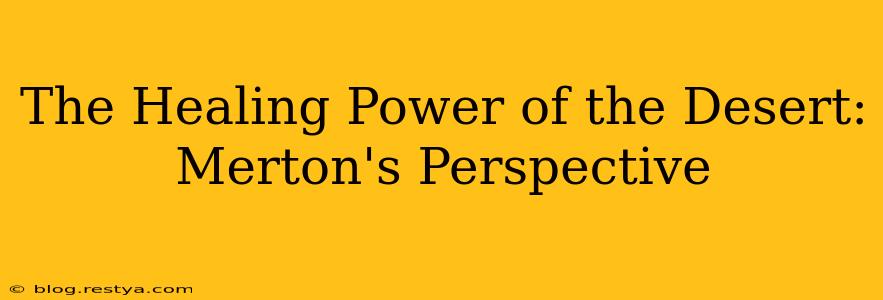Thomas Merton, the renowned Trappist monk and writer, found solace and profound spiritual healing in the stark beauty of the desert. His experiences, meticulously documented in his writings, offer a unique lens through which to understand the desert's transformative power, a power that transcends mere physical landscape and touches the very core of the human spirit. This isn't simply about escaping the hustle of modern life; it's about a profound encounter with oneself, with God, and with the raw, untamed essence of creation.
Merton's journey into the desert wasn't a flight from reality but a deliberate seeking—a pilgrimage inward. He wasn't looking for an escape, but a deeper understanding of his relationship with the world and his place within it. The desert, with its austere beauty and demanding conditions, became a crucible for his spiritual transformation. It forced him to confront his inner demons, strip away societal conditioning, and connect with something larger than himself.
What Did Merton Find in the Desert?
Merton didn't just find physical solitude in the desert; he discovered a spiritual solitude that allowed for profound self-reflection. The vast emptiness became a space where his thoughts and emotions could unfold without the distractions of everyday life. This profound silence, often described as a "sacred silence," fostered an intimate connection with the divine. He found in the desert a space for true prayer, a conversation with God unburdened by the noise of the world.
How Did the Desert Help Merton's Spiritual Growth?
The desert's harsh environment mirrored the internal struggles Merton faced. The deprivation and physical challenges forced him to confront his limitations and rely on faith and inner resilience. This process of stripping away the superficial and embracing vulnerability became a catalyst for spiritual growth. The desert became a teacher, offering lessons in humility, patience, and the acceptance of limitations.
What are the Key Lessons from Merton's Desert Experiences?
Merton's desert experiences offer several key lessons relevant to our contemporary lives. They highlight the importance of solitude for self-discovery and spiritual growth. The desert became a powerful metaphor for the inner journey, emphasizing the need to confront our inner demons and embrace vulnerability as essential elements of personal transformation. His experiences also underscore the need to find a balance between the contemplative life and engagement with the world, highlighting the interconnectedness of all things.
What is the Significance of Silence in Merton's Desert Experiences?
Silence, for Merton, was not merely the absence of noise but a positive presence, a space for the divine to speak. In the silence of the desert, he found the ability to listen to the subtle whispers of God's presence, a connection often obscured by the clamor of daily life. This silence allowed for deeper introspection and fostered a more profound relationship with his faith. It was a space where he could truly connect with his inner self and find a path towards genuine spiritual growth.
How Did Merton’s Desert Experiences Influence His Writings?
Merton’s desert experiences deeply influenced his writing, imbuing his words with a profound sense of spiritual insight and contemplative wisdom. His journals and essays, filled with vivid descriptions of his desert encounters, offer a window into the transformative power of solitude and the importance of finding a deeper connection with oneself and the divine. These experiences shaped his perspectives on spirituality, social justice, and the human condition, leaving an enduring legacy for readers seeking spiritual meaning.
How Can We Apply Merton's Lessons to Our Modern Lives?
While few of us may embark on a physical journey to a remote desert, we can all cultivate the spirit of Merton's desert experience. This involves creating space for solitude and reflection in our daily lives. This could be through regular meditation, spending time in nature, or simply creating quiet moments for contemplation. By embracing silence and introspection, we can begin to cultivate a deeper understanding of ourselves, our relationship with the divine, and our place in the larger world – mirroring the transformative power Merton found in the desert. The essential lesson is not about geographical location, but about the internal landscape we cultivate. The healing power of the "desert" resides within us all.

